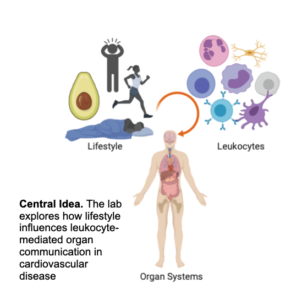
The Swirski Lab at the Cardiovascular Research Institute at Mount Sinai
Many of the known risk factors for cardiovascular disease — obesity, hypertension, hypercholesterolemia, diabetes — are directly linked to lifestyle and environment. We know that a balanced diet, regular exercise, good sleep hygiene, and avoidance of certain kinds of stress (distress vs. eustress) will prolong our lives. And yet, despite an incessant drumbeat of warnings about the dangers posed by unhealthy habits, we succumb to those dangers far too often. Seeking to understand how lifestyle affects our biology is important because it may help identify tissular, cellular, and molecular mechanisms central to how the body adapts to environmental stressors. These insights can teach us how nature figured it out; we can then adapt and widen those insights to improve our lives.

A central animating idea of our lab is that leukocytes are uniquely positioned to connect lifestyle stressors with organ systems. Leukocytes, we argue, are key to how lifestyle affects biology. Leukocytes are dispersed throughout the body (macrophages reside in all tissues, perhaps with the exception of cartilage), motile, and interactive. Although leukocytes are typically understood as immune system “foot soldiers”, we now know that many of their functions have, at least on the surface, nothing to do with immunity. Leukocytes are key participants in metabolism, the endocrine and nervous systems, and physiology as a whole. Our research is motivated by and entwined with this idea.
